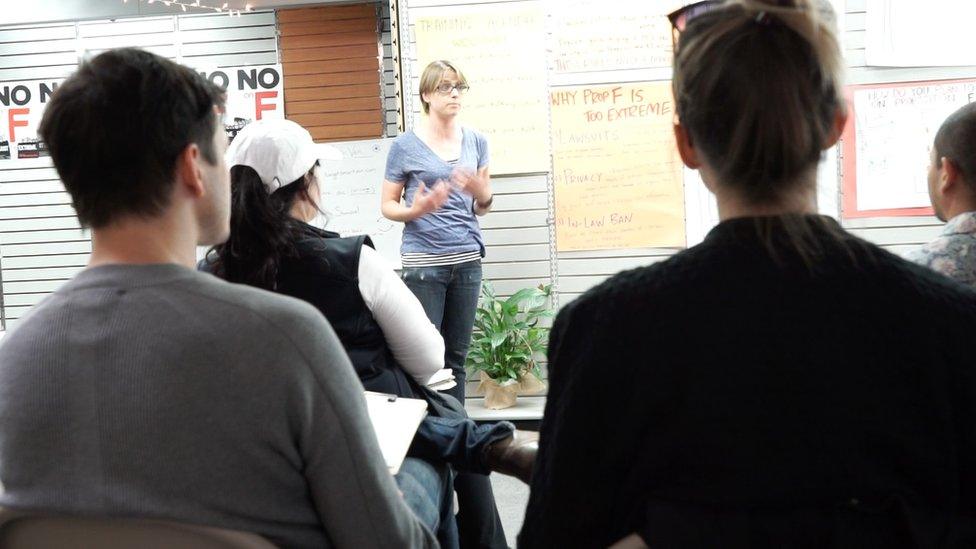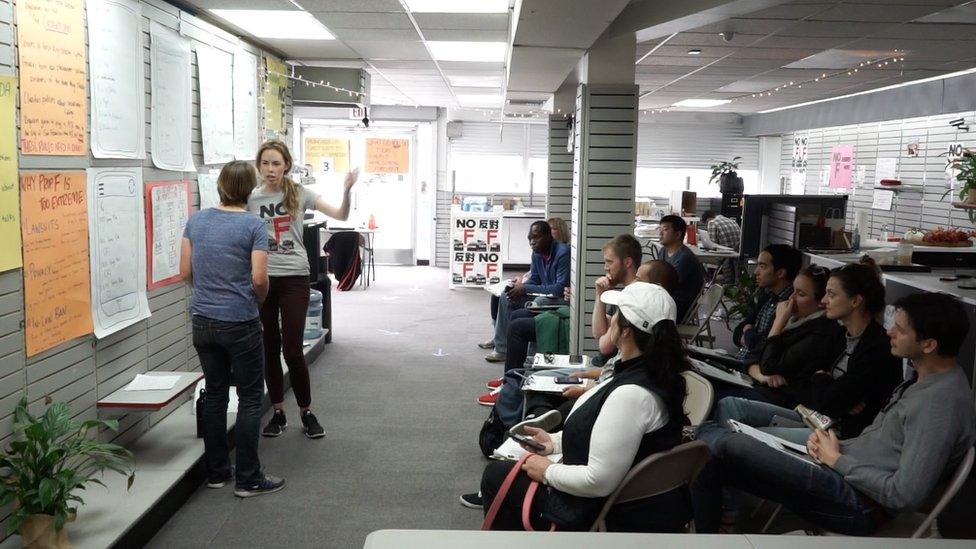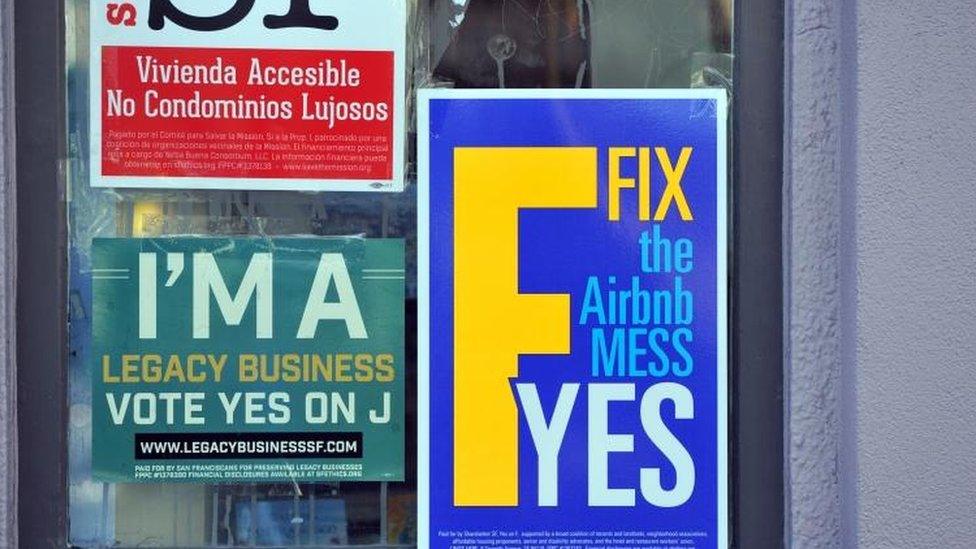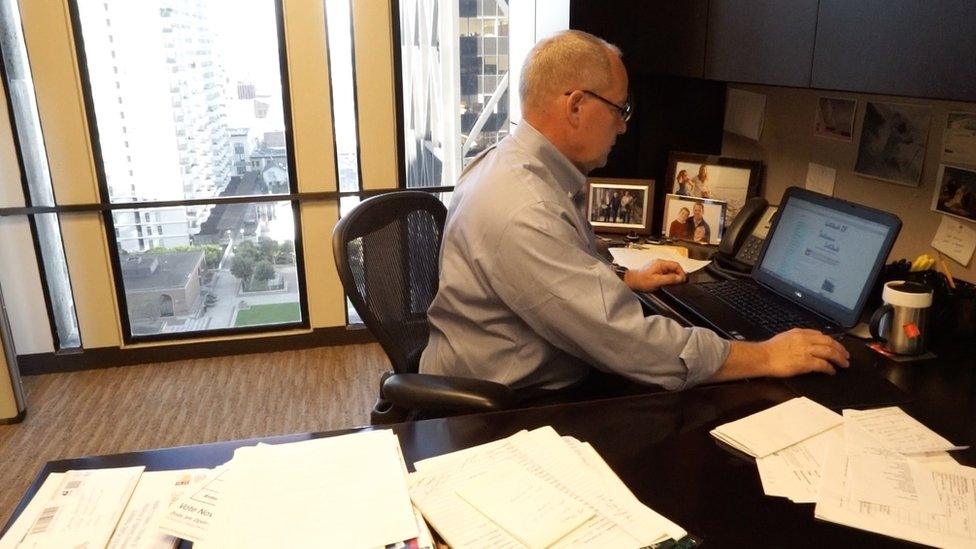'AirBnB law' heads to the polls - what's at stake?
- Published
- comments
San Francisco is gripped by a housing crisis, as Dave Lee reports
When I first arrived in San Francisco, I went through what every newcomer has to endure - clicking through endless Craigslist entries in the hope of finding somewhere to live.
One promising-looking listing, posted by some bloke named Sebastian, offered a neat studio apartment near the wonderful Golden Gate Park. I dropped Sebastian a line.
A day later, he replied, apologising. The flat hadn't been rented out, he told me, but they'd decided to turn it into an AirBnB instead - meaning they can list the room on the room-sharing website for tourists to stay in.

San Francisco is just 7x7 miles - and is gripped by a housing crisis
And that, in a nutshell, is what the "Yes on Prop F" campaign is unhappy about. In a city suffering from a serious housing crisis, having liveable spaces being made into profitable mini-hotels isn't helping.
And who can blame landlords - even small rooms in San Francisco are being offered on AirBnB for hundreds of dollars a night. It's a great earner.
On Tuesday, San Franciscans head to the polls to cast their view on a number of things, but what everyone is paying special attention to is Proposition F.
Prop F - or "oh, that ban AirBnB thing?", as locals refer to it - seeks to put in place tougher rules on home-sharing. So tough, actually, that it will essentially ruin AirBnB's business model in the city.
People would only be able to rent out their homes for a maximum of 75 days a year - or be liable for hefty fines.
Big time backer

At the No on Prop F campaign office, volunteers are trained in how to talk to potential voters
That's why the "No on Prop F" campaign is being funded by more than $8m (£5.2m) of AirBnB's cash.
Its campaign headquarters is packed with volunteers - some of them AirBnB hosts - and, well, technology. The office, which spans two floors of an old Radioshack store, has the feel of a grassroots political movement. But the reality is AirBnB's money has paid for a highly-sophisticated operation to maximize the vote.
No on Prop F supporters are armed with smartphones giving them access to reams of data on the voters they are trying to target, a level of political intelligence that means every door-knock is worthwhile.
Patrick Hannan, the campaign's spokesman, showed me rooms with people hitting the phones, in four different languages, to get people voting. They're not trying to change opinions, Mr Hannan told me, but instead going after people they know are likely to be against Prop F and make sure they bother to vote.
While I visited, I observed a role-play of a typical door knock. The argument the No on Prop F team (so, AirBnB) is bringing to the city is that Prop F will encourage people to spy on their neighbours. Why? Because Prop F allows residents to sue their neighbours if they think they are running an AirBnB illegally.

Role play sessions offer suggested techniques for talking about voter’s concerns or questions
They also argue that, contrary to many people's understanding, AirBnB hosts already pay the same taxes levied against hotels in the city.
Yes on F counters this by saying that the many AirBnB hosts ignore this requirement, and don't notify the city when they are offering rooms.
As I was leaving the No on Prop F office, Mr Hannan offered a more romantic view of why he felt the proposition wasn't fair, one that speaks to San Francisco's free spirit - an attitude to life that you can quite literally smell in the air (if you hang out in certain parks, that is).
"The San Francisco that I'm raising my children in is a place of inclusion, not exclusion. We welcome people who are different from ourselves. We welcome communities that may not fit neatly into our cultural fabric.
"To the people who are now deciding that some people aren't welcome in San Francisco, I have one word for them - malarkey!"
Long fight
The Yes on F campaign expects to lose. Its funding, of around $1m, has been partly helped by the hotel trade.

Supporters of Proposition F are said to be in the minority
When I met Dale Carlson - the campaign's spokesman - he cut a fairly solemn figure of someone who had resigned to getting beat, but still felt obliged to do media interviews.
"If we lose, OK," he said. "This is a long fight.
"AirBnb isn't the cause of our housing crisis. But it's a piece of it, a significant piece."
I offered him Mr Hannan's "malarkey!" perspective.
"Corporations like AirBnB don't spend $10m on political campaigns because they're worried about neighbourhood harmony," he said.
"They're not worried about neighbours spying on each other, or suing each other. They're worried about neighbours suing AirBnB."
Symbolic city
I approached AirBnB to talk about the vote, but I was not offered any spokespeople to interview.
But last week, the company invited a handful of technology and business journalists to dinner - where they shared a few plans for its future, which included offering more "offline" services beyond room listings.

Yes to Prop F’s spokesman Dale Carlson has resigned to losing the vote
The AirBnB employees at the dinner (a mixture of product team and PR) didn't want to be drawn on what would happen to if Prop F was to pass.
San Francisco isn't the firm's biggest city in terms of hosts - that's Paris - but some of the fightback here is symbolic in that this is where it all began.
Other cities around the US are also looking and assessing what impact AirBnB (and others like it) are having on the make-up of their communities.
But AirBnB's financial commitment to this battle, one it may face in all of its markets, shows it is a company that is powering ahead with its aims and is prepared to spend heavily to remove any chance of regulatory constraints.
Like that other great disrupting start-up, taxi service Uber, AirBnB's strategy appears to be to become so beloved by its users - both hosts and guests - that any political attempt to kill it off would be very unpopular indeed.